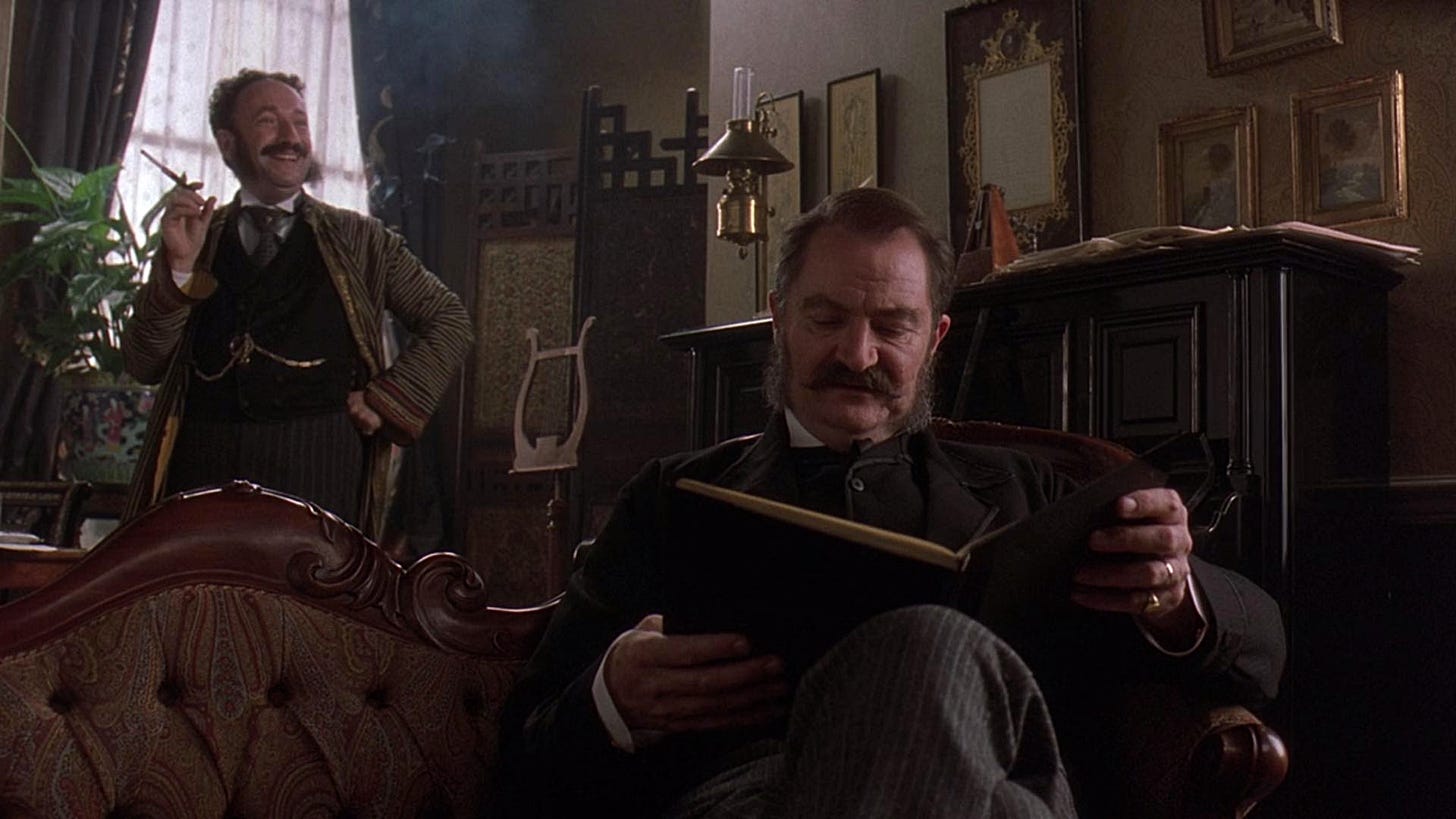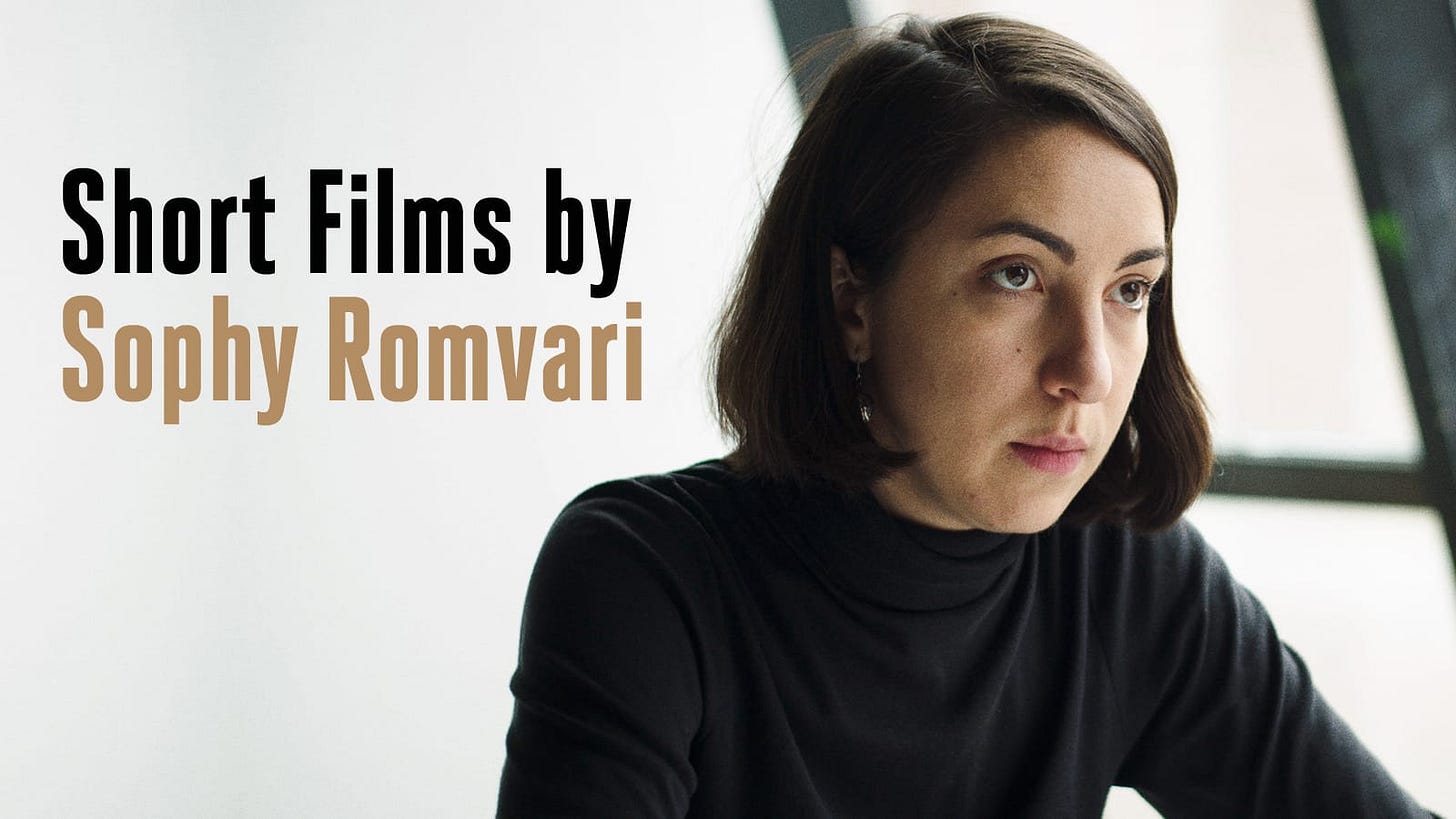VoC Dispatch: March 2022
Housekeeping, updates, links, Éric Rohmer Day, and the films of Sophy Romvari.
In this newsletter: some housekeeping, some news, some links, and a short essay on the films of Sophy Romvari.
Housekeeping: What’s up with The Vocation of Cinema?
Good question. It’s been very busy here behind the scenes, and very quiet in terms of actually posting. Since publishing ‘The Making of a Cinephile’ last fall, I’ve been working almost exclusively on the next entry in the Cinephilia series (working title: ‘Cinephilia and Crisis’) which has sprawled into two and three part versions. I am still figuring out how exactly to parcel it out, but it is on the way, with the first part planned to drop in April.
In addition to continuing the Cinephilia series, I am also working this spring on essays about:
What Aristotle’s Poetics and Mel Gibson’s The Passion of the Christ have to tell us about the unique challenges of adapting the Gospels into poetic or dramatic form.
A filmmaker-centric response to two brilliant essays on Catholic literature I read in the last month: Trevor Cribben Merrill’s The Situation of the Catholic Novelist and Joshua Hren’s Contemplative Realism. Think of it as a ‘Situation of the Catholic Filmmaker.’
A look at some resonances in the aesthetic thinking of André Bazin and Jacques Maritain.
Three announcements:
One new thing you will notice is this current newsletter before you. That’s right - I’m launching an actual newsletter-within-the-newsletter called VoC Dispatch. This will be a once-a-month collection of news and updates from both the VoC world and my wider professional life as a writer and filmmaker, as well as links of interest and an occasional short essay or profile.
A second new feature, VoC Roundup, will be exclusively for paid subscribers. This will be an end-of-month review of what I’m reading and watching of late. The format to start will be a short essay on one or two films and a book.
Because the Roundup will become the principal perk for paid subscribers, I’ve decided to open up commenting to any and all comers. So, if you’ve been burning to throw down your two cents, now you can!
Finally, I want to say a heartfelt thank you to those who have jumped on as paid subscribers during these early days. I cannot express how much your support has meant to me purely as a vote of confidence, and I hope you’ll enjoy the Roundup as a thank you for your generosity.
I also owe a big thank you to those who have supported and shared this project privately and publicly these last few months. I’ll be honest - it has been a much slower start (on my end) than I hoped for, but the wheels are turning and gaining just a bit of speed day by day.
If you think you know someone who would enjoy this endeavour, please do share it with them. And if you’re reading this and thinking about subscribing at any level, well, here’s the blue button to help you out. Thanks, friends.
Year in Review
In case you missed it: I wrote some notes on my favourite books and films of last year.
My Books of 2021 - On works by Jane Austen, Walker Percy, J.F. Powers, André Bazin, Étienne Gilson, St. Teresa of Avila, and more.
My Films of 2021 - On films by Mike Leigh, Éric Rohmer, William Wyler, Alfred Hitchcock, Anthony Mann, Bertrand Tavernier, the Dardennes Brothers, and many others, including a special shout-out to some faded curiosities of 2001.
Podcast
It’s been a busy spring with Criteria: The Catholic Film Podcast, where I moonlight as a recurring guest host. I was privileged to contribute to two recent episodes:
In February, we discussed Leo McCarey’s 1937 masterpiece The Awful Truth. This is probably my favourite comedy of all time and it was a lot of fun to unpack it with show hosts Thomas Mirus and James T. Majewski.
This month, we had the great pleasure of discussing Federico Fellini’s La Strada (1954) with poet, philosopher, and professor James Matthew Wilson.
Watch on Youtube or listen wherever you get your podcasts.
March 21: Éric Rohmer’s Birthday
March 21st marked the 102nd birthday of Éric Rohmer, the great filmmaker, critic, Catholic, and French New Wave icon. On this occasion two years ago, I had the privilege of co-organizing (with Dan Sallitt) an impromptu Zoom symposium featuring two of Rohmer’s most important collaborators, actress Marie Rivière and film editor Mary Stephen.
Ms. Rivière is well-known for her indelible performances in Rohmer films such as The Green Ray (1986) and Autumn Tale (1998). Ms. Stephen began working with Rohmer in the 1980s and eventually became his main editor from A Tale of Winter (1992) until his death in 2010.
Take a trip back to a time when none of us knew how a Zoom conference was supposed to work and check out our conversation, which was recorded on March 21, 2020. My thanks again to all who participated.
Further Rohmerian reading:
Aliza Ma’s 2020 interview with Mary Stephen (Metrograph)
Tim Markatos on ‘Two Identities, One Faith: The Unspoken Catholicism in the Films of Éric Rohmer’ (Plough)
Trevor Cribben Merrill on Rohmer’s early and failed career as a novelist. (The University Bookman)
Links
Things I’ve been enjoying of late…
In a moving reflection which starts with phenomenology and ends in theology, Collin Brinkmann considers the resonances of two very different 2021 films. (The 15:17 to Cinema)
Using Dietrich Von Hildebrand, Milan Kundera, and Martin Mosebach as respective jumping-off points, novelist Trevor Cribben Merrill muses briefly on ‘Three Lessons in Beauty (Genealogies of Modernity)
I had the pleasure of reading Joshua Hren’s monumental new literary essay Contemplative Realism: A Theological-Aesthetic Manifesto earlier this month, and hope to write at length about it in the not-too-distant future. If you’re looking to get your feet wet, he’s recently published an adapted version which introduces, condenses, and reflects on the main themes of the larger work. (Mere Orthodoxy)
Watch: Andrew Petiprin, Fellow of Popular Culture at the Word on Fire Institute, is leading a new video series, Watch With Me, on film, faith, aesthetics, and the Church. Check out the first episode on Youtube. (Word on Fire Institute)
Spotlight: Sophy Romvari on the Criterion Channel
To mark the occasion of my friend and colleague Sophy Romvari’s films becoming available on the Criterion Channel, I have written some reflections on what her work means to me as a filmmaker. Here’s how it starts:
Sophy Romvari has carved out a fascinating and flourishing oeuvre of short films in just six years. Her approach to filmmaking is deeply personal, often drawing on her own familial and cultural background (her immediate family immigrated to Canada from Hungary in the 1980s). At the same time, her essence as a filmmaker remains hard to pin down: each film she has made departs from its predecessor in unpredictable and inventive ways. These films are stylistically distinct, traverse subjects both universal (family, grief, disconnection) and particular (the ethics of Barbra Streisand cloning her dogs), and move dextrously in and out of fiction, non-fiction, and in-between, establishing hers as a truly distinctive voice in the contemporary landscape of North American cinema.
I’ve had the privilege of being friends with Sophy since 2015, and of working on her first two films: Nine Behind (2016), as camera operator, and It’s Him (2017), as producer. It gives me great joy, then, to share that both of those films and six others produced between 2015 and 2021 are now available to view on none other than the Criterion Channel. And while I’m obviously biased to some degree, I would like to share a couple of words about what her films mean to me.
Read the rest here. Congratulations, Sophy!
Postscripts
“It is difficult for me to tell you about them [Going My Way and The Bells of St. Mary], because each little incident in them had great importance. Moreover, I have a theory about that, with a very exact name: ‘the ineluctability of incidents,’ which is applied to the construction of all of my films. To formulate it another way: if something happens, some other thing inevitably flows from it. Like night and day follow each other, events are linked together, and I always develop my story this way, in a series of incidents, of events which succeed each other and provoke each other. I never really have intrigue.”
- Leo McCarey to Serge Daney and Jean-Louis Noames, ‘Taking Chances’, Cahiers du Cinéma, Feb. 1965 (trans. Jane Pease & Rose Kaplin, Cahiers du Cinema in English, Jan. 1967, p. 53)
“One remembers the discovery of La Strada as an aesthetic experience of great emotion, as an unanticipated encounter with the world of imagination. I mean that this is less a case of a film’s having known how to attain a certain intellectual or moral level than of its having made a personal statement for which the cinema is most surely the necessary and natural form, but which statement nevertheless possesses a virtual artistic existence of its own. It is not a film that is called La Strada; it is La Strada that is called a film.”
- André Bazin in ‘La Strada’, Esprit, May 1955 (trans. Bert Cardullo, Bazin at Work, 1997, p. 113)






